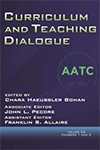
Curriculum and Teaching Dialogue
Vol. 23 # 1 & 2
Edited by:
Chara Haeussler Bohan, Georgia State University
John L. Pecore, University of West Florida
Franklin S. Allaire, University of Houston-Downtown
A volume in the series: Curriculum & Teaching Dialogue. Editor(s): Chara Haeussler Bohan, Georgia State University. John L. Pecore, University of West Florida. Franklin S. Allaire, University of Houston-Downtown.
Published 2021
Curriculum and Teaching Dialogue is a peer-reviewed journal sponsored by the American Association for Teaching and Curriculum. The purpose of the journal is to promote the scholarly study of teaching and curriculum. The aim is to provide readers with knowledge and strategies of teaching and curriculum that can be used in educational settings. The journal is published annually in two volumes and includes traditional research papers, conceptual essays, as well as research outtakes and book reviews. Publication in CTD is always free to authors. Information about the journal is located on the AATC website and can be found on the Journal tab at http://aatchome.org/about-ctd-journal/.
CONTENTS
Acknowledgments. 2020 KEYNOTE ADDRESSES: The Apposing Curriculum, P. Bruce Uhrmacher, Caitlin Lindquist, and Bradley Conrad. VOLUME 23, NUMBER 1: Editorial Remarks: What Do Teachers Need to Rejuvenate and Recapture “Good Work” in a Post-Pandemic World? Chara Haeussler Bohan. Student Success on the High Plains of Western Kansas, Matthew A. Clay. Exploring the Self-Empowering Uncertainties of Teaching Mathematics for Social Justice: Narratives From a Teacher Educator and a Classroom Teacher, David W. Stinson and Dean W. Potts. Teachers Talk About War and Peace, Gulistan Gursel-Bilgin and David J. Flinders. Beyond Answers in Watertight Containers: CLD Strategies in Art Education, Donna Goodwin. Disclosing Race and Racism: The Imperative and Practices of Race-Situated Connoisseurship, Tara Meister. Reinterpreting Early-Career Teacher Identity Tensions as the Emerging Awareness of Existential Freedom, Aaron S. Zimmerman. “Why Are You So Mean Ms.?!”: When Gendered Classroom Dynamics Interfere With Teacher-Student Relationships, Ganiva Reyes. VOLUME 23, NUMBER 2: Editorial Remarks: Meeting the Needs of Migrant Children and Their Families, John L. Pecore. Leveraging Affection: Embedded Tensions in a Teacher’s Relationships With Students, David R. M. Saavedra. Toward Transformative Teaching for English Language Learners: Critical Texts in Sheltered English Immersion Courses, Andrew Habana Hafner and Floris Wilma Ortiz. “I Still Don’t See the Problem With Treating Each Student as an Individual”: Science Preservice Teachers’ Views on Diversity and Race in the Science Classroom, Seema Rivera and Preethi Titu. Becoming a Trauma-Informed Educational Community With Underserved Students of Color: What Educators Need to Know, Jennifer V. Pemberton and Ellen K. Edeburn. Educational Reform and Donor Funding in Postcolonial Ghana, Eddy D. Asiedu and Joseph R. Feinberg. The Mathematics Digital Curriculum Boom: How Are Programs Selected? Steven Rhine, Shannon O. S. Driskell, Kristen R. Rolf, Zach Hurdle, and Kaitlin Bundock. Removing the Assurance Through Insurance: Conceptually Redesigning Risk Management and Insurance Standards, Michael Ladick. OUTTAKES: The Head Nod: Realizing the Value of a Diverse Research Team, Kawanna Bright and Amy VanScoy. Archival Silence as a Learning Opportunity, Debra A. Hardy. A Remembered Story of a Teacher’s Best-Loved Self, Denise McDonald. Utilizing Heideggerian Concepts: Freighting Anti-Semitism? Paul Parkison, Daniel R. Conn, and Michelle Tenam-Zemach. Nonstarter: Research and Sexual Misconduct Do Not Mix, Jay C. Percell. Navigating Loss While Engaging in Research: One Grieving Mother’s Journey, Evthokia Stephanie Saclarides. Talking with Your Thumbs: Group Texts as a Data Source, Janet B. Turner. The Power of Local Allyship: Securing the Out-of-Reach Fijian Research Permit, Elizabeth Laura Yomantas. Adapting Technology in a Virtual Exchange Project Across the U.S. and China, Jie Zhang and Ann M. Giralico Pearlman. BOOK REVIEWS: A Kids Book About Death by Taryn Schuelke, Reviewed by Josephine Ampaw. Scripted Bodies: Corporate Power, Smart Technologies, and the Undoing of Public Education by Kenneth Saltman—Winner of the 2020 O. L. Davis, Jr. Outstanding Book Award, Reviewed by Daniel R. Conn, Michelle Tenam-Zemach, and Paul Parkison. STEM-Rich Maker Learning: Designing for Equity With Youth of Color by Angela Calabrese Barton and Edna Tan, Reviewed by Helen Douglass. SEL From the Start: Building Skills in K–5 by Sara E. Rimm-Kaufman, Reviewed by Dana Lewis Haraway. A Coherent Curriculum for Every Student: Curriculum Proposals for Possible Adoption by Edmund C. Short, Reviewed by Cheryl A. Lindeman. Thinking Ahead: Engaging All Teachers in Critical Thinking by Paul A. Wagner, Daphne Johnson, Frank Fair, and Daniel Fasko Jr., Reviewed by Amy Nelson. Everyday Advocacy: Teachers Who Change the Literacy Narrative by Cathy Fleischer and Antero Garcia, Reviewed by Stephanie Schneider. John Dewey’s Imaginative Vision of Teaching: Combining Theory and Practice by Deron Boyles, Reviewed by Cristy Sellers Smith. Lesson Planning With Purpose: Five Approaches to Curriculum Design by Christy McConnell, Bradley Conrad, and P. Bruce Uhrmacher, Reviewed by Jason Trumble. Content Area Reading: Literacy and Learning Across the Curriculum by Richard T. Vacca, Jo Anne L. Vacca, and Maryann Mraz, Reviewed by Omah M. Williams-Duncan. About the Authors.
-
Paperback978-1-64802-623-2
Web price: $45.04 (Reg. 52.99)
-
Hardcover978-1-64802-624-9
Web price: $80.74 (Reg. 94.99)
- eBook978-1-64802-625-6

-
 Curriculum and Teaching Dialogue
Volume 24, Numbers 1 & 2, 2022
Curriculum and Teaching Dialogue
Volume 24, Numbers 1 & 2, 2022
-
 Curriculum and Teaching Dialogue
Volume 25, Numbers 1 & 2, 2023
Curriculum and Teaching Dialogue
Volume 25, Numbers 1 & 2, 2023
-
 Curriculum and Teaching Dialogue
Vol. 18 # 1 & 2
Curriculum and Teaching Dialogue
Vol. 18 # 1 & 2
-
 Curriculum and Teaching Dialogue
Vol. 19 # 1 & 2
Curriculum and Teaching Dialogue
Vol. 19 # 1 & 2
-
 Curriculum and Teaching Dialogue
Vol. 20 # 1 & 2
Curriculum and Teaching Dialogue
Vol. 20 # 1 & 2
-
 Curriculum and Teaching Dialogue
Vol. 21 # 1 & 2
Curriculum and Teaching Dialogue
Vol. 21 # 1 & 2
-
 Curriculum and Teaching Dialogue
Vol. 22 # 1 & 2
Curriculum and Teaching Dialogue
Vol. 22 # 1 & 2

